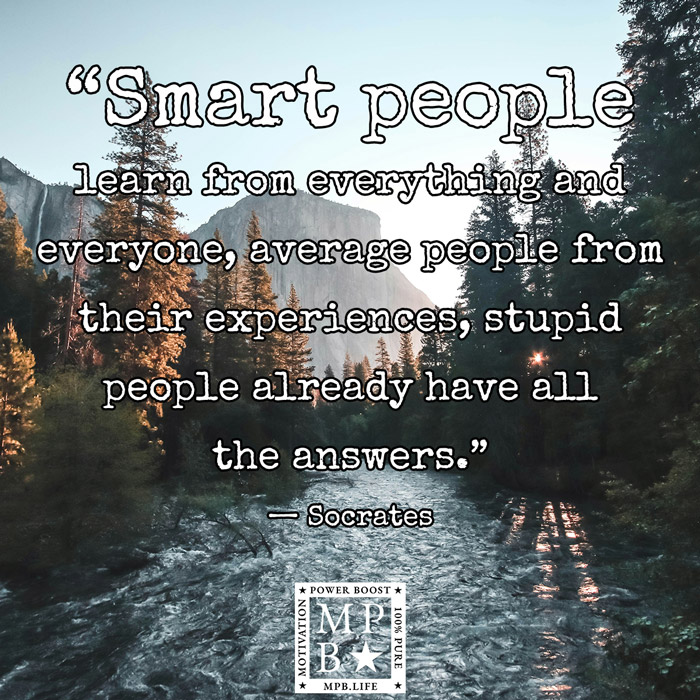
Smart People Learn From Everything Graphic © motivationpowerboost.com
“Smart people learn from everything and everyone,
average people from their experiences,
stupid people already have all the answers.”
— Socrates
The Wisdom of Lifelong Learning
Socrates, the ancient Greek philosopher, once said, “Smart people learn from everything and everyone, average people from their experiences, stupid people already have all the answers.” This profound statement encapsulates the essence of wisdom and the importance of continuous learning throughout one’s life.
Those who are truly intelligent recognize that knowledge can be gleaned from every encounter and every individual they meet. They approach life with an open mind, eager to absorb new ideas and perspectives. These smart people understand that learning is not confined to the classroom or limited to a specific stage of life. Instead, they view every moment as an opportunity to expand their understanding of the world around them.
Average individuals, on the other hand, tend to rely solely on their own experiences to shape their knowledge and beliefs. While personal experiences are undoubtedly valuable, they represent a limited scope of understanding. By failing to look beyond their own lives, average people miss out on the wealth of wisdom that can be gained from the experiences of others.
Conversely, those who are foolish believe they already possess all the answers. They are closed-minded, refusing to entertain new ideas or consider alternative viewpoints. This arrogance stunts their personal growth and prevents them from evolving in response to the ever-changing world around them.
The path to true wisdom lies in embracing the mindset of the smart—the lifelong learners. By actively seeking out new knowledge and diverse perspectives, we can broaden our horizons and deepen our understanding of the complex tapestry of life. We must recognize that everyone we encounter, from the most erudite scholar to the humblest street sweeper, has something valuable to teach us.
Moreover, the pursuit of learning should not be limited to intellectual pursuits alone. We can learn from the triumphs and failures of others, from the beauty of nature, and from the quiet moments of introspection. Every experience, whether positive or negative, holds a lesson waiting to be discovered.
In a world that is constantly evolving, the ability to adapt and grow is essential. Those who cling stubbornly to their preconceived notions and refuse to learn from others will find themselves left behind. On the other hand, those who embrace the wisdom of lifelong learning will navigate the complexities of life with greater ease and find themselves better equipped to make a positive impact on the world.
So, let us strive to be among the smart—the individuals who recognize the value of learning from everything and everyone. Let us approach each day with curiosity, humility, and an open mind. By doing so, we will not only enrich our own lives but also contribute to the collective wisdom of humanity. After all, as Socrates reminds us, the mark of true intelligence lies not in having all the answers, but in the unending pursuit of knowledge and understanding.
The Roots of Socratic Wisdom
To fully appreciate the profound impact of Socrates’ words, it is important to understand the context from which they emerged. Socrates, born in 470 BCE in Athens, Greece, was a pivotal figure in the development of Western philosophy. His unique method of teaching, known as the Socratic method, revolutionized the way people approached knowledge and understanding.
Socrates believed that true wisdom did not come from merely accumulating facts, but rather from a process of questioning, self-examination, and critical thinking. He would engage his students in dialogues, probing their assumptions and challenging their beliefs through a series of carefully crafted questions. This method aimed to expose contradictions and inconsistencies in their thinking, ultimately leading them to a deeper level of understanding.
One of Socrates’ core principles was the idea that “knowledge is virtue.” He believed that once an individual gained true knowledge and understanding, they would naturally act in an ethical and virtuous manner. This belief underscored the importance of lifelong learning and the constant pursuit of knowledge as a means of cultivating wisdom and moral character.
Socrates’ influence extended far beyond his lifetime, shaping the philosophical traditions of the Western world. His teachings inspired some of the greatest thinkers in history, including Plato, his most famous student, and Aristotle, who studied under Plato. The Socratic method remains a cornerstone of critical thinking and intellectual discourse to this day.
By examining the roots of Socrates’ wisdom, we gain a deeper appreciation for the timeless nature of his words. The pursuit of knowledge and the willingness to question our assumptions are not mere intellectual exercises; they are fundamental components of personal growth, ethical decision-making, and the cultivation of a truly wise and virtuous life.
Related Inspirational Quotes
“The only true wisdom is in knowing you know nothing.” — Socrates
“He who learns must suffer. And even in our sleep pain that cannot forget falls drop by drop upon the heart, and in our own despair, against our will, comes wisdom to us by the awful grace of God.” — Aeschylus
“It is impossible for a man to learn what he thinks he already knows.” — Epictetus
“Knowledge speaks, but wisdom listens.” — Jimi Hendrix
“The only source of knowledge is experience.” — Albert Einstein
